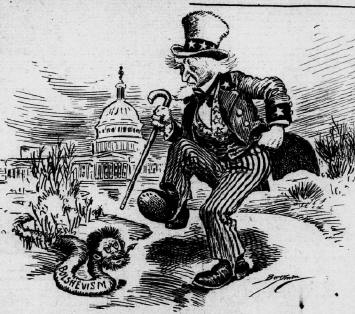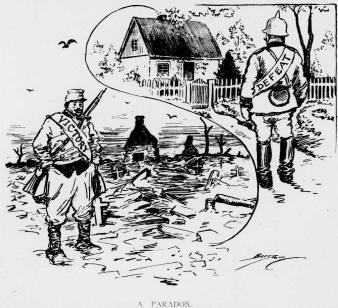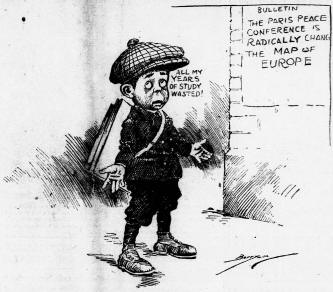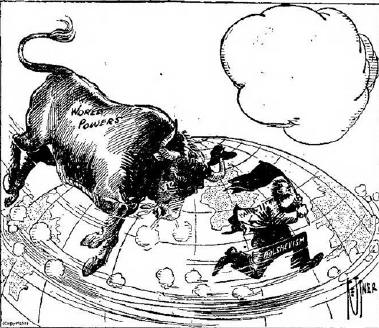February
1919
League of
Nations vs Monroe Doctrine
February
7
Future of German Colonies
Debated
 The Allied powers have agreed
that the German colonies shall
not be returned to Germany,
owing to mismanagement, cruelty
and the use of those colonies as
submarine bases. The conquered
regions of Armenia, Syria,
Mesopotamia, Palestine and
Arabia shall be detached from
the Turkish Empire.
The Allied powers have agreed
that the German colonies shall
not be returned to Germany,
owing to mismanagement, cruelty
and the use of those colonies as
submarine bases. The conquered
regions of Armenia, Syria,
Mesopotamia, Palestine and
Arabia shall be detached from
the Turkish Empire.
Provision is made whereby the
well-being and development of
backward colonial regions are
regarded as a sacred trust of
civilization, over which the
League of Nations shall exercise
supervisory care. The
administration of these regions
is entrusted to the more
advanced nations, who will act
in behalf of the League of
Nations.
Those nations charged with the
care and development of the
colonial regions will undertake
actions based upon the stage of
current development and
potential for self-government.
The mandates in Palestine,
Syria, and other portions of
Turkey, where well-developed
civilization exists, would be
comparatively light and would
probably include a certain
degree of self-governance.
On the other hand, colonies like
those in Central Africa would
require extensive management to
suppress the slave trade, the
liquor traffic, ammunition and
arms traffic, and the prevention
of military authority on the
part of the natives, except for
native police purposes.
Other colonies, such as those in
German Southwest Africa, and
some of the South Pacific
islands, have such sparse and
scattered populations and are so
separated from other communities
that the allied countries
charged with their oversight
will probably simply assume them
into their existing empires.
Meanwhile it is reported Japan
has reiterated her intention to
hold the Marshall and Caroline
Islands in the Pacific ,which
she took from Germany during the
war, as well as her interest
upon the execution of her
agreement, reached in September
last, with China, regarding
Japan’s control of Shanghai.
Dardanelles Care May Fall To
U. S.
It has been learned that a
movement within the peace
conference is to make the United
States the trustee of
Constantinople and the
Dardanelles. The French point of
view is that the Americans
technically are admirably
equipped to improve the port and
the straits as they never were
improved under the Turkish
administration.
Moreover France considers that
American proven
disinterestedness is the best
possible guarantee that all
nations involved in commerce to
and from the Black Sea will be
treated with absolute fairness.
The European powers seem to feel
that the United States is acting
queerly in a hesitating to
accept trusteeship over some of
the more difficult regions of
the old world. “You have taken
the lead,” they say, “in the
movement to reorganize the world
on a just and liberal basis, yet
you have seen not to desire to
accept full responsibility for
the reorganization.”
Our Monroe Doctrine however will
have lost all meaning if we
accept the League of Nations say
some. As by accepting the
League, it opens the door for
European meddling in the affairs
of the American continent.
American that sill adhere to
this Doctrine therefore desire
to frustrate the adoption of the
League’s treaty in the Senate.
When it is pointed out that the
United States might accept the
trusteeship of Samoa and other
Pacific islands where we already
have interest, Europeans reply;
“Yes, you are willing to
administer places where no real
difficulty is involved, but when
it is a question of a real
important region, like
Constantinople, you hesitate.”
Huns Face Stiff Terms
 The Allies will probably demand
stiff terms be imposed upon
Germany, whose tactics of tacit
resistance are said to have
reached a climax in a threat
made at Weimar by the German
Chancellor to break off
negotiations with the allies.
The Allies will probably demand
stiff terms be imposed upon
Germany, whose tactics of tacit
resistance are said to have
reached a climax in a threat
made at Weimar by the German
Chancellor to break off
negotiations with the allies.
The feeling in peace conference
circles is that the Germans are
more and more forgetting their
position, and it is expected
that the Supreme War Council
will take measures to bring them
to a sense of the realities.
Marshall Foch will meet with the
Germans on February 17 to fix
the conditions for the third
renewal of the armistice. It is
understood that the Council will
fix a brief time within which
the Germans must carry out the
conditions they have only
fulfilled in part. In this
respect it is noted that none of
the German merchant ships which
were to have been sent to
certain allied ports have yet
been handed over.
The supreme war Council also
will fix the size of the
contingents of France, Great
Britain, the United States and
the Allied nations in the armies
of occupation, both in Europe
and Asia.
The Naval branch of the peace
conference, bearing mainly on
the turning over of the German
submarines, blockade
restrictions and the surrender
of the German commercial fleet
is progressing. This fleet, it
is stated, is ready to be turned
over, but the allies have not
yet agreed on the allotment of
the ships among the various
allied nations nor on the
compensation for the use of the
vessels.
The proposal that the German
warships now in Scapa Flow, be
sunk is practically certain to
be accepted by the peace
conference. The destruction of
the ships is abdicated on the
grounds that their division
among the victors would cause
heartburn. The vessels,
numbering five battle cruisers,
11 battleships, eight cruisers
and 50 destroyers, be escorted
out into the Atlantic and be
sunk. The question of dealing
with the surrendered submarines
will be considered separately
where they shall be sunk or
preserved.
Another point for which the
British naval build vacation
will press at the peace
conference will be the raising
of Heigoland. This would be as
tremendous undertaking, as the
island is about one third of a
mile square and its highest
point is 190 feet, while the
post is fortified with concrete
and steel. And enormous quantity
of explosives would be required,
but, it would be the best way of
consuming the German reserves of
high explosives.
February 14
America for Americans
“American for Americans only” is
the declared policy, which the
American peace delegates here
are striving to obtain so as to
ensure that the United States
may not become involved in
European affairs any further. In
this way America can maintain
the Monroe Doctrine, and at the
same time, live up to
requirements placed upon it by
the League of Nations.
It is assumed that when
President Wilson takes the
American public into his
confidence, he will be able to
announce that the sovereign
interest of America has been
protected by the agreement
drafted in Paris. This is due to
the adamant demand that America
remain aloof from petty
squabbles and intrigue designed
to drag her into the mire of
European politics.
As currently proposed, the
League of Nations will be a
permanent Executive Council,
consisting of 12 delegates,
principally from the great
powers, which will decide most
of the international questions.
It will meet once a year.
Nations will be represented
proportionally to their size and
strength.
There will be an international
tribunal for questions in
litigation, an international
economic council and various
special commissions, but these
have not yet been determined.
Finally, there will be an
international army, composed of
contingents from the different
countries, under command of an
international staff.
A series of economic and boycott
measures will be adopted as a
means of exercising pressure on
hostile states. If two states
insist, despite everything, on
fighting, the League will permit
them to do so on condition that
they observe the rules of
warfare, which will be drafted
by the League. If the rules
aren't followed the League may
intervene.
The League as now envisioned
goes well beyond the original
American idea, which the
European allies considered too
weak to be effective. The
present plan bears a strong
resemblance to the American
Constitution with a powerful
executive and as separate
parliament and a tribunal.
France & Belgium Demand
Reparations
 The French and the Belgian plea
that they should be permitted to
recoup their enormous losses by
the destruction of their
industrial plants through the
stoppage of German industries
until France and Belgium had
been rehabilitated is met by the
American view, which is shared
by the British, that such losses
should be reimbursed by cash
indemnities from Germany within
a responsible time. The supreme
Economic Council can regulate
the distribution of raw
materials between countries so
as to ensure France and Belgium
have a proper advantage over
Germany and prevent the latter
from gaining the world's market.
The French and the Belgian plea
that they should be permitted to
recoup their enormous losses by
the destruction of their
industrial plants through the
stoppage of German industries
until France and Belgium had
been rehabilitated is met by the
American view, which is shared
by the British, that such losses
should be reimbursed by cash
indemnities from Germany within
a responsible time. The supreme
Economic Council can regulate
the distribution of raw
materials between countries so
as to ensure France and Belgium
have a proper advantage over
Germany and prevent the latter
from gaining the world's market.
The French are growing more
negative towards American’s
daily. French officials seek to
deny it. But when confronted
with the preponderant weight of
evidence they finally have to
admit that it is true.
The average argument of the
average Frenchman today is:
“Well, what did American do in
the war, anyway, that she should
come here to dictate whether we
are to have full reparations and
complete indemnification to any
extent, we may desire to ask?”
The allies are not antagonistic
to France being fully
indemnified for the ruin created
by the Germans. They want France
to have everything to which she
is truly justified, but object
to retarding the business of
peace by trying to incorporate
in the settlement France's
economic problems, when this can
be handled by other bodies
satisfactorily.
But while insisting that Germany
pay for her heinous deeds, they
insist also that Germany be
giving a chance. France's
demands that Germany be
handicapped commercially until
France has rehabilitated her
industries is not without
justification and is defensible
in many respects.
France has suffered more than
any other nation in the war. Her
prosperous northern regions are
hideous remnants of once
thriving communities. Years will
lapse before France’s financial
standing is maintained without
outside assistance. One
sympathizes with France's
desperate need of assistance and
extremely plucky efforts to
solve her commercial dilemma.
It is impossible to ascertain
the exact detail of the damage
inflicted during the war and the
French argue that judgments
should be agreed upon and placed
in the peace treaty on the basis
of a fairly comprehensive
examination already made by
agents of the Allied powers.
Figures in possession of experts
of the peace conference are
believed to give a close
approximation of the total sum
Germany is able to pay.
February 21
Huns Accept New Armistice Terms
The German government on Sunday
night accepted the Allied terms
for the extension of the
armistice. The German
government, meeting in Weimer,
debated the new armistice
conditions through Saturday
night.
The Berlin staff of the foreign
office is without special
information regarding the
armistice proposal which
apparently were published here
only in part. The staff
therefore was unable to express
a definitive opinion regarding
the proposed German Polish
frontier.
The new frontier as outlined,
appears at least as favorable to
the Germans as the present
military situation, and leaves
them in control of the railroad
line to East Prussia, which is a
vital artery of communications
with the troops operating
against the Bolsheviks. On the
other hand the demarcation line,
which coincides generally with
the language boundary framed by
the Poles, deprives Germany of
an agriculture region on which
the authorities say Germany
depends for large amount of food
and grain supplies.
Turkey To Lose All Ground In
Europe
 New states are to be carved out
of belligerent countries.
Advocates of immediate peace
declare that such readjustments
as are necessary to proceed
after the signing of the peace
treaty. They say that Germany,
Austria, Turkey and Bulgaria
should simply be required to
sign treaties relinquishing such
parts of former territories as
are required to form new states
and rectify old boundaries.
New states are to be carved out
of belligerent countries.
Advocates of immediate peace
declare that such readjustments
as are necessary to proceed
after the signing of the peace
treaty. They say that Germany,
Austria, Turkey and Bulgaria
should simply be required to
sign treaties relinquishing such
parts of former territories as
are required to form new states
and rectify old boundaries.
What is to become of Turkey?
Will the peace conference in
Paris remember the outrageous
perpetrated upon civilians by
the Ottoman Empire and,
regardless of strictly racial
and religious boundaries, to
divide turkey that it shall
never again retreat the crimes
of the past.
In a perfunctory way the future
of Turkey has been discussed by
representatives of various
nations, but as yet no
definitive decision has been
reached. But that Turkey must be
rendered in potent and that
Turkey must pay in full for sins
of the past is a premise from
which all consideration of the
question starts.
It would appear that Turkey is
to lose every foot of ground she
now possesses in Europe, and she
will be forced back over the
Dardanelles to the south east,
and that the limits of her
domain will stand only as far
south as Syria and as far east
as Armenia.
Turks are sure to be barred from
realizing their old time mastery
and undisputed domain in the
Caucuses, Mesopotamia, and
Palestine. In these regions,
which for centuries has suffered
under the baneful influence of
control by unscrupulous persons
in Constantinople will be
forever free from repression.
Turkey, territorial speaking,
will shrink to less than one
half of its former size and will
in great measure be dependent
for substance on the outside
world with the loss of rich
agricultural and mineral lands
to the east and to the south.
Though there has been general
agreement that Palestine, Syria,
and Mesopotamia, will fall under
French and British control and
that these countries will be
permitted eventually to emerge
free and independent of any
outside influence whatsoever,
there is not the same intention
or opinion or desire as to the
Dardanelles in Constantinople.
The world has long considered
that this great international
waterway and the Turkish capital
could be internationalized - has
in fact they undoubtedly will be
- since the treaty between
France and England and Russia,
which promise Constantinople and
the Dardanelles to Russia, have
been rendered null by
developments in Russia, but in
the meantime there exists rival
leagues for eventual control of
the Dardanelles and
Constantinople.
The French government, declaring
that Constantinople long has
been under direct French
influence, has set about to run
things there notwithstanding the
fact other European governments
consider that if any steps be
taken it should be by a group of
nations and not one. The British
on the other hand have
dispatched forces to the
Dardanelles and to
Constantinople and dual
authority has sprung up.
The actions of the French in
taking control of Constantinople
was to be expected, insomuch as
the occupation naturally fell to
the allied army operating in
Macedonia under the French. That
this was a fortunate
circumstance for France in view
of French desires to further her
interest in the Dardanelles and
Constantinople is generally
conceded.
But it was the extension of
military influence by the French
in Turkish regions and the
Italians on the Adriatic coast
that led the peace conference to
sound warning that unwarranted
occupation of territories which
were supposed to be held by
international forces and that
were to distributed equally by
the peace conference.
February 28
Senators Say League Means
Advocating US Sovereignty
 “Free American government will
be displaced by an international
government controlled by
European monarchs and Asiatic
despots, if the League of
Nations plan is adopted,” says
Sen. Reid of Missouri. The
Missouri senator delivered an
eloquent appeal that this
country should hold to the
doctrine of George Washington
and avoid entangling alliances.
“Free American government will
be displaced by an international
government controlled by
European monarchs and Asiatic
despots, if the League of
Nations plan is adopted,” says
Sen. Reid of Missouri. The
Missouri senator delivered an
eloquent appeal that this
country should hold to the
doctrine of George Washington
and avoid entangling alliances.
When he closed his address the
Senate chamber rang with
applause, led by members of the
Senate on both sides of the
chamber, and in which the
galleries joined. Applause in
the Senate chamber is against
the rules and has rarely been
heard.
Following the address of Sen.
Reid, senator after senator
announced he would discussed the
League of Nations this week,
until it became apparent that
this topic would occupy the
Senate almost to the exclusion
of other businesses until the
close of the present session of
Congress. .
Senator Reid, in attacking the
proposed constitution of the
League of Nations, declared that
it meant the abdication of
American sovereignty in
violation of the Constitution
night stays and that it would
involve the United States in all
foreign wars. He supported the
charge of Sen. Boroh, of Idaho,
that the League would abrogate
the Monroe doctrine, involve
America in all world conflicts
and compel submission of vital
American questions to a foreign
tribunal.
Denouncing the League as a
movement of internationalism,
Sen. Reid asserted that the
fangs of Bolshevism were plainly
visible in the Leagues
Constitution. “The provision
requiring America to fight
foreign wars”, he said, “was
monstrous.”
“The League's charter,” Senator
Reid declared, “plainly
conflicted with the American
Constitution,” but he said he
would reserve discussion of that
point until a future time.
“Shall we surrender with a pen
what George Washington gained by
his sword,” asked another
senator. “Shall we repudiate the
nationalism under which we have
become the first people of the
Earth for the doubtful
experiment of internationalism?
Shall we make our government of
the people, by the people, and
for the people , a government
partially for the people and
partially by teams and emperors?
The answer to these questions is
involved in the acceptance or
rejection of the proposed
constitution of the League of
Nations.”
There was complete realization
of the fact that the greatest
contest between the executive
and the treaty ratifying power
of the Senate, which the country
has ever witnessed, is now on.
Opponents in the Senate of the
President's plan were not
unmindful of the possibilities
of the situation. They realize
fully that they are facing a
dangerous outlook. They are
quite well aware of the
possibilities of an appeal such
as the president is to voice and
other campaign such as he has
embarked upon.
While declaring his full
sympathy with the purpose to
form an international peace
tribunal, Sen. Cummings of Iowa,
Republican, in his speech in the
Senate, declared that he was
opposed to the proposed
constitution of the League of
Nations because he believed some
of its provisions would strike
at American sovereignty.
Presenting the outlines of
arguments he would favor, Sen.
Cummings, said: “the League's
draft presented a Paris would
form a world nation, with
polyglot and incoherent power
which would submerge the
American Republic.” In the
course of his address he urged
speedy conclusion of a peace
treaty with Germany in immediate
inauguration of reconstruction
work too advert unrest.
Another senator said article 10,
providing guarantees against
aggression and for territorial
and political independence of
states, is the most destructive,
unjust, and reactionary proposal
ever submitted. “We are asked to
guarantee that the boundaries of
nations as they now exist, or
when the peace conference has
withdrawn the map of Europe,
Asia, Africa and Oceana shell
remain without change forever.”
Said the Senator.
Senator Henry Cabot Lodge a
Massachusetts, solemnly warn the
American people today to weigh
carefully the Constitution of
the League of Nations as
presented to the peace
conference at powers and to
insist upon its fundamental
revision. Speaking in the
Senate, the Republican floor
leader declared his conviction
that instead of safeguarding the
peace of the world, the League
as now planned, would encourage
misunderstandings and strife,
and laid the foundation for
another World War.
Read past editions of News Reports From the Front
Have a newspaper clipping on a event that took place in Emmitsburg?
If so, send it to us at history@emmitsburg.net